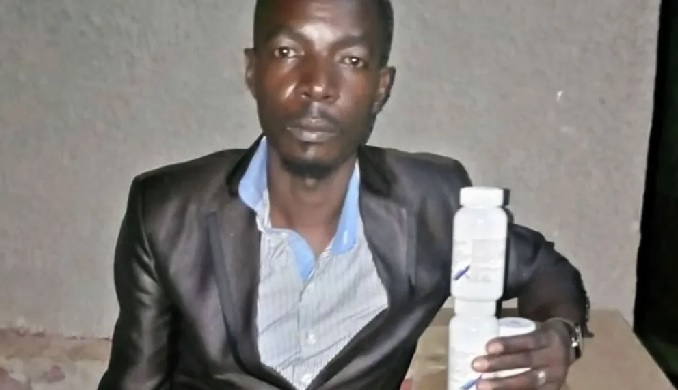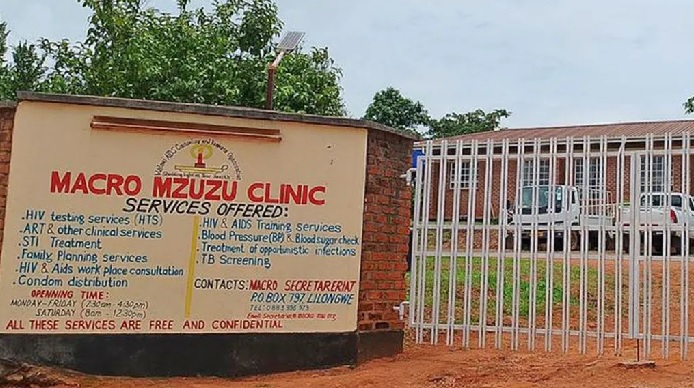
'My wife fears sex, I fear death' - impacts of the USAID freeze
Life for Mike Elvis Tusubira, a motorcycle taxi rider with HIV in Uganda, has been turned upside down since US President Donald Trump halted foreign aid last month.
Not only does the 35-year-old fear for his own survival as he takes life-saving anti-retroviral (ARV) drugs - but he says he will have to split up from his wife as they can no longer have safe sex.
His partner is HIV-negative and relies on PrEP, a medicine that reduces the risk of contracting HIV.
"It means that even my marriage will end, because actually without the preventive measures, she's not going to stay," he told the BBC.
Advertisement
"No condoms, no [anti-HIV] lubricants, no PrEP, nothing. We can't stay in marriage without meeting. It means that I have to stay single."
All the couple's medicines and contraceptives were supplied thanks to funding from the US government's main overseas aid agency USAID.
Since the sudden shutdown, which he heard about on social media, they have not been able to replenish their supplies. His wife has completely run out of PrEP now and they are both afraid that relying just on condoms - they have some left - is too risky.
Trump ordered the 90-day pause on foreign aid on his first day back in office, after which stop-work orders began to be issued to organisations funded by USAID.

Waivers were subsequently issued for humanitarian projects, but by that time the HIV programme Mr Tusubira was part of - run out of Marpi Clinic in the north of the capital, Kampala - had closed.
He phoned his counsellor at the Kiswa Health Centre III in the city to find out what was going on.
"My counsellor was in the village. He told me that he is no longer at the clinic."
The father of one, who tested positive for HIV in 2022, has since missed a test to determine how much virus is in his blood and the strength of his immune system.
"I'm moving in the dark, in the darkness. I don't know whether my viral load is suppressed. I'm traumatised."
He does not think his job driving a motorbike taxi - known locally as a "boda-boda" - will be able to help his family get over the hurdles they now face.
"Some other people say that the drugs will be in private pharmacies... as a boda-boda rider I don't know whether I can raise the money to sustain my treatment."
They have also been impacted by the loss of services provided by non-government organisations (NGOs) that received funding from USAID, he says.
His wife was getting her PrEP via an NGO at Marpi and his five-year-old son was benefitting from one that provided school and food for vulnerable children.
"My child is no longer at school now," he said.
Uganda's health sector is heavily reliant on donor funding, which supports 70% of its Aids initiatives.
The East African nation is among the top 10 recipients of USAID funds in Africa. According to US government data, the country received $295m (£234m) in health funding from the agency in 2023 - ranking third after Nigeria which received $368m and Tanzania with $337m.

USAID also supports its malaria, tuberculosis and leprosy programmes - as well as funding maternal and child health services and emergency health assistance.
Thousands of healthcare workers have been impacted by the US funding freeze.
Dr Shamirah Nakitto, a clinician with Reach Out Mbuya (Rom) - a faith-based community organisation providing medical and psychosocial support to people living with HIV in Uganda - was based at Kisenyi Health Centre IV, which serves a densely populated slum in Kampala.
On average, she attended to 200 patients with HIV/Aids and tuberculosis daily. But after the stop-work order, all Rom-supported health workers were laid off.
Its tuberculosis unit now stands silent and its orphans and vulnerable children section has also been shut at Kisenyi.
"We are waiting for the 90 days. So, this compulsory leave, I hadn't prepared for it," she told the BBC.
"It was so abrupt. We didn't have a proper handover at the facility. We just stopped working."
Uganda's health ministry says it is exploring ways to minimise disruptions.
Dr Diana Atwine, the top civil servant at the ministry, urged staff "willing to continue working in the spirit of patriotism as volunteers" to get in contact.
Further south in Malawi, USAID-funded activities have also ground to a halt.
The country received $154m from USAID's health budget in 2023, making it the 10th largest recipient in Africa.
In the northern city of Mzuzu, the gates are shut at a clinic that has been a key provider of HIV services in the region. Vehicles sit idle; there is no sign of activity at the Macro Mzuzu Clinic. Workers locked the doors, turned off the lights and went home 18 days ago.
Despite the US State Department's waiver on 28 January allowing the delivery of medicine such as ARVs, many clinics have closed as without the critical staff who co-ordinate USAID's activities, distributing medicines is a challenge.
Even where services are technically permitted to resume, many contracts remain in limbo. Health workers are unsure of what they can and cannot do.
The Trump administration plans to reduce USAID staff by more than 90%.
Atul Gawande, USAID's former global health assistant administrator, posted on X that the agency's workforce would be slashed from 14,000 to 294 - with only 12 staff assigned to Africa.
More than 30 NGOs in Malawi have also been severely impacted by the funding freeze.
Eddah Simfukwe Banda, a 32-year-old subsistence farmer, has been getting ARVs since 2017 from the Macro clinic, where various NGOs were providing HIV programmes.
She is worried about her own fate - and that of her sister-in-law, who also relies on donor-funded medication - and says they little option but to pray.
"We have to pray as Malawians. Those of us that believe depend on a God who opens doors when one is closed," she told the BBC.
The mother of three, who has a three-week supply of ARVs left, also said systemic failures were to blame: "As Malawians, we depend too much on receiving aid. At times we are lazy and squander and rely on other countries to help us.
"Let this be a lesson that we have to be independent," she said.
But this is difficult for one of the poorest and most aid-dependent countries in the world. According to the World Bank, Malawi is vulnerable to external shocks - including prolonged droughts, cyclones and erratic rainfall.
A disruption of this magnitude in its healthcare system presents an enormous challenge.
For decades, the US has been Africa's most significant public health partner.
In particular through its ground-breaking programme to counter the global spread of HIV, which was launched in 2003. Called the US President's Emergency Plan for Aids Relief (Pepfar), it has saved more than 25 million lives.
According to head of the Africa Centres for Disease Control and Prevention (Africa CDC), USAID gave $8bn of aid assistance to Africa over the past year.
"Seventy-three per cent went to healthcare," Jean Kaseya told BBC Newsday last month.
Health experts warn that replacing this funding will be extremely difficult.
African governments have made strides in reducing aid dependency. Kenya now funds nearly 60% of its HIV response. South Africa covers almost 80%.
But for many low-income nations, debt burdens, climate disasters and economic shocks make self-sufficiency nearly impossible.
Amref Health Africa, one of the leading health NGOs on the continent, warns that without urgent action, global health security is at risk.
"This would require African governments and Africa CDC to increase their own funding, which is almost impossible under the current debt distress conditions," its CEO Dr Githinji Gitahi told the BBC.
"With accelerating outbreaks from climate change and human-environmental conflict, this would leave the world fragile and unsafe - not only for Africa but for everyone."
Worldwide in 2023, there were 630,000 Aids-related deaths and 1.5 million new infections.
While infection rates have been declining in the worst-affected countries, the impact of the USAID shutdown could reverse these gains.
"If you take away this major contribution by the United States government, we expect that in the next five years, there'll be an additional 6.3 million Aids-related deaths," Winnie Byanyima, the head of UNAids, told the BBC's Africa Daily podcast this week.
"There will be 8.7 million new infections, 3.4 million additional Aids orphans. I don't want to sound like a prophet of doom, but I have a duty to give the facts as we see them."
The medical charity Médecins Sans Frontières (MSF) has also warned of the dangers of interrupting HIV treatments.
"HIV medicines must be taken daily or people run the risk of developing resistance or deadly health complications," Tom Ellman, from MSF Southern Africa, has said in a statement.
Back in Uganda, Mr Tusubira feels bleak about the future.
He has about 30 days left of his ARV medication - and may opt to leave Kampala and go home to his village after that.
"At least it will be a bit simpler. If I die, they just bury me there, instead of disturbing my people here in Kampala.
"Because I have no way I can live here without ARV services."
